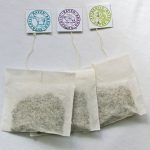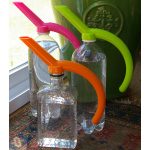designed for the way women work.

Compost Tea vs. Fertilizer for your Houseplants: What’s the Difference?
Category: Presenting "The Curious Gardener"
Lately we have heard a lot of talk about microbes and the biology of soil. In the past we spoke of plant fertilizers in terms of N-P-K (Nitrogen, Phosphorus, Potassium) and that seemed to be the end of discussion.

Last Spring we approached Annie Haven of Haven Family Ranch in San Juan Capistrano, California, a farm run by the Haven family for more than 160 years. She sells muslin bags of aged cow and horse manure, as well as alfalfa, that can be steeped in water like tea and fed to plants. We wanted to create our own tea bags using her product to sell with our Eco Watering Spouts for houseplants. We were told just one tea bag in a one-liter bottle provides a strong enough formula for houseplants, so off we went. Here are our tea bags:
It’s worth mentioning that Annie’s California livestock feeds on grass with no antibiotics, pesticides or hormones added—so it’s safe to use her tea on edible plants as well. Says Ms. Haven, “What goes in as simple California-grown grass comes out as all-natural cow and horse manure.” Her manure is aged one year so that its nitrogen content is reduced to a level that won’t harm roots of young plants.
What is the ‘compost vs. fertilizer’ debate about?
The benefits of compost include conditioning of the soil so it helps the plant create stronger roots, according to the publication Compost Fundamentals from WSU extension. Fertilizers, especially manmade, water soluble ones, are designed as a quick fix for the plant and may generate a growth spurt, but are not as effective for the longterm health of the soil and plant.
As reported in WSU’s publication, experiments indicate that compost manures have beneficial effects greater than those to be expected from nitrogen, phosphorus, potassium and humus content alone.
– Compost contains macro and micronutrients often absent in synthetic fertilizers.
– Compost releases nutrients slowly, unlike synthetic fertilizers.
– Compost contains beneficial microorganisms that may protect plants from diseases and pests.
– Compost can reduce or eliminate the need for synthetic fertilizers.
Manure Tea is a ‘green-minded’ solution for Home Gardeners
The idea of bagging manure and selling it for tea may have come out of a need to find ways to turn farm manure from a waste product to a resource. Large quantities of farm manure in one location can be hazardous to the environment, yet in small quantities spread over a large area it is just the opposite. Even leaf drop has municipalities scrambling to find ways to dispose of it in environmentally sound ways. If every home owner in America purchased just one bag of aged manure for their garden per year, would the problem be solved? It’s worth a try.



